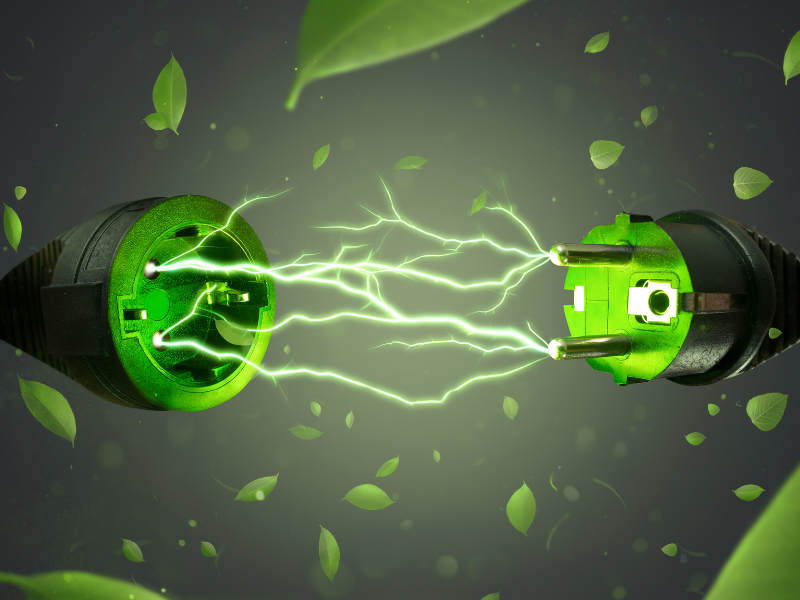In today’s rapidly evolving world, the need for clean and sustainable sources of energy has never been more critical. Green energy, also known as renewable energy, is gaining recognition as the best way to meet our energy demands while minimizing the negative impact on the environment.
The best advantages of green energy are widespread and encompass various aspects, including environmental, economic, and social benefits. This article will explore and delve into the numerous advantages of adopting green energy technologies and practices.
The Meaning of Green Energy

Green energy refers to energy that is produced from renewable sources, such as sunlight, wind, water, and biomass. Unlike traditional energy sources like fossil fuels, green energy harnesses natural elements that are continuously replenished, making it a sustainable and environmentally friendly choice. The transition towards green energy is driven by the need to reduce greenhouse gas emissions, combat climate change, and promote a cleaner and healthier planet for future generations.
The Importance of Green Energy

The importance of green energy cannot be overstated. As the global population continues to grow, so does the demand for energy. Traditional energy sources, such as coal, oil, and natural gas, are finite resources and contribute to significant environmental pollution and degradation. The best advantages of green energy lie in its ability to provide a viable and sustainable alternative to fossil fuels, offering long-term energy security, reducing greenhouse gas emissions, and mitigating the adverse effects of climate change.
The Best Advantages of Green Energy

Lower Environmental Impact
One of the clearest advantages of green energy is its significantly lower environmental impact compared to traditional energy sources. Fossil fuels release large amounts of carbon dioxide and other harmful pollutants into the atmosphere when burned, contributing to air pollution, climate change, and various health issues. In contrast, green energy technologies produce little to no air pollutants, helping to preserve the integrity of our ecosystems and protect human health.
Renewable and Sustainable
Green energy sources are often referred to as renewable because they have an endless supply. The sun, wind, and water are constantly available and can be harnessed to generate electricity or heat without depletion. This sustainability ensures that future generations will have access to energy without compromising the availability of resources for their own needs.
Energy Independence
Green energy offers the promise of energy independence, reducing reliance on fossil fuels and foreign energy sources. By harnessing the power of renewable resources within a country’s borders, nations can secure their energy supply and mitigate the economic and political risks associated with importing fossil fuels. This advantage enhances energy security and promotes national autonomy.
Cost Savings
While the initial investment in green energy technologies may be higher, the long-term cost savings make it a financially attractive option. Renewable energy technologies, such as solar panels and wind turbines, have lower operating costs and can generate electricity at competitive prices. Additionally, as renewable energy becomes more widespread, economies of scale and technological advancements are driving down the costs further, making it increasingly affordable for consumers and businesses.
Job Creation
The shift towards green energy is also driving job creation and economic growth. The renewable energy sector is experiencing rapid expansion, creating a multitude of employment opportunities in various fields, including manufacturing, installation, operation, and maintenance of green energy infrastructure. These jobs contribute to local economies and foster innovation and competitiveness in the global market.
Improved Air Quality
By substituting fossil fuel-based energy sources with green energy, we can greatly improve air quality. Traditional power plants and vehicles emit pollutants that can cause respiratory problems, cardiovascular diseases, and other health issues. Green energy technologies produce little to no air pollutants, resulting in cleaner air and a healthier environment for both humans and wildlife.
Reduced Dependence on Fossil Fuels
One of the best advantages of green energy is the reduced dependence on finite fossil fuel resources. Traditional energy sources are vulnerable to price fluctuations and supply disruptions, as they often rely on imports from distant and politically unstable regions. By embracing green energy, countries can shift away from fossil fuels and invest in domestically available renewable resources, enhancing energy resiliency and reducing geopolitical risks.
Lower Water Consumption
Green energy technologies generally have lower water consumption compared to conventional power plants. Traditional coal and nuclear power plants require massive amounts of water for cooling, which can strain local water supplies and harm ecosystems. In contrast, renewable energy sources such as solar and wind power do not require water for operation, thereby conserving this vital resource and reducing environmental impacts.
Climate Change Mitigation
Green energy plays a crucial role in mitigating climate change, one of the most pressing challenges of our time. Greenhouse gas emissions from burning fossil fuels are the primary drivers of global warming. By transitioning to renewable energy sources, we can significantly reduce carbon dioxide and other greenhouse gas emissions, helping to stabilize global temperatures and mitigate the adverse effects of climate change on people and the planet.
Energy Security
Green energy enhances energy security by diversifying energy sources and reducing reliance on a single energy provider. Since renewable resources are abundant and widely distributed, countries can tap into local energy sources, reducing vulnerability to supply disruptions, price volatility, and geopolitical tensions associated with fossil fuel imports.
Reduced Transmission and Distribution Losses
Green energy technologies, such as distributed generation systems, can be located closer to where the electricity is consumed. This proximity reduces the need for long-distance transmission and distribution infrastructure, minimizing energy losses during electricity delivery. The decentralized nature of green energy can improve overall efficiency and contribute to a more resilient and reliable energy grid.
Diverse Energy Sources
Green energy encompasses a wide range of energy sources, including solar, wind, hydro, geothermal, and biomass. This diversity ensures that energy production is not reliant on a single resource, reducing the risk of supply disruptions and price shocks. By harnessing various green energy sources, we can achieve a more balanced and sustainable energy mix.
Long-Term Economic Stability
Investing in green energy provides long-term economic stability by creating jobs, attracting investments, and promoting sustainable economic growth. The renewable energy sector has shown tremendous potential for job creation, innovation, and technological advancements, strengthening local economies and positioning countries at the forefront of the clean energy transition.
Reduced Dependence on Foreign Energy Sources
The best advantages of green energy include minimizing dependence on foreign energy sources. Many countries rely on imports to meet their energy demands, exposing them to global market uncertainties and price fluctuations. By embracing green energy, nations can tap into their domestic renewable resources, reducing the need for imports and enhancing energy sovereignty.
Technological Innovation
The transition towards green energy is driving innovation in the energy sector. Researchers, scientists, and engineers are continually developing and improving green energy technologies, making them more efficient, cost-effective, and accessible. These advancements contribute to technological progress and have far-reaching implications for various industries beyond the energy sector.
Health Benefits
Green energy offers significant health benefits, primarily by reducing air pollution and its associated health risks. Traditional energy sources release pollutants that are known to cause respiratory problems, cardiovascular diseases, and even premature death. By transitioning to green energy, we can improve public health, reduce healthcare costs, and create a healthier living environment for communities.
Localized Power Generation
Green energy allows for localized power generation, empowering communities to produce their own electricity and become more self-sufficient. Distributed generation systems, such as rooftop solar panels, enable individuals and businesses to generate their own power and reduce reliance on the traditional grid. This decentralization promotes community resilience and enhances energy access, particularly in remote or underserved areas.
Reduced Noise Pollution
Unlike traditional power plants, which can be noisy and disruptive to surrounding communities, green energy technologies operate quietly. Wind turbines, for example, have undergone significant advancements, reducing noise levels and addressing concerns about noise pollution. This advantage allows for the coexistence of green energy infrastructure and residential areas without compromising quality of life.
Increased Resiliency and Reliability
Green energy can enhance the resiliency and reliability of the energy grid. Distributed generation systems, such as solar panels and wind turbines, create a decentralized network that is more robust against power outages and other disruptions. In the event of natural disasters or grid failures, localized green energy sources can continue to provide electricity, improving the overall reliability and resilience of the energy system.
Potential for Rural Development
Green energy holds immense potential for rural development, particularly in areas with abundant renewable resources. By leveraging local energy sources, rural communities can meet their energy needs, create jobs, and stimulate economic growth. Access to green energy technologies can bridge the energy gap between urban and rural areas, ensuring equal opportunities for development and building sustainable communities.
Education and Awareness
The transition towards green energy requires education and awareness to foster widespread adoption. By promoting the benefits of green energy, we can sow the seeds of change and inspire individuals, communities, and governments to embrace sustainable energy practices. Educational initiatives are crucial in empowering individuals to make informed choices and actively participate in the clean energy transition.
Enhanced Grid Flexibility
Green energy technologies offer greater grid flexibility, enabling the integration of diverse energy sources and accommodating fluctuations in supply and demand. Energy storage systems, such as batteries, allow excess energy from intermittent sources like solar and wind power to be stored and used during periods of high demand. This flexibility ensures a reliable and stable electricity supply, regardless of weather conditions or time of day.
Reduced Greenhouse Gas Emissions
The best advantages of green energy include its significant contribution to reducing greenhouse gas emissions. Carbon dioxide and other greenhouse gases trap heat in the atmosphere, leading to global warming and climate change. By replacing fossil fuel-based energy sources with renewable alternatives, we can reduce these emissions and mitigate the adverse effects on the environment and human health.
Reduced Risk of Oil Spills
Green energy technologies, such as wind and solar power, do not rely on oil extraction or transportation, eliminating the risks associated with oil spills. Oil spills have devastating effects on marine ecosystems, wildlife, and local communities. By embracing green energy, we can reduce reliance on oil and minimize the environmental and economic damages caused by oil spills.
Community Empowerment
Green energy empowers communities by enabling local energy production, storage, and distribution. Community-owned renewable energy projects allow residents to collectively invest in and benefit from renewable energy generation. This empowerment fosters a sense of ownership, civic engagement, and cooperation, strengthening community bonds and promoting sustainable development.
Preservation of Natural Resources
Green energy helps preserve natural resources by reducing the extraction and consumption of finite resources like coal, oil, and natural gas. These resources are often located in sensitive ecosystems, and their extraction leads to habitat destruction, water pollution, and other environmental damages. By transitioning to green energy, we can preserve our natural heritage and protect biodiversity for future generations.
Frequently Asked Questions (FAQs)

What are the best advantages of green energy?
Green energy offers numerous advantages, including lower environmental impact, energy independence, cost savings, job creation, improved air quality, reduced dependence on fossil fuels, and climate change mitigation, among others.
How does green energy help in reducing greenhouse gas emissions?
Green energy sources do not emit significant amounts of greenhouse gases during operation, unlike fossil fuels. By transitioning to green energy, we can replace carbon-intensive energy sources, reduce greenhouse gas emissions, and combat climate change.
Can green energy provide reliable power supply?
Yes, green energy technologies have become increasingly reliable and can provide a stable power supply. Advances in energy storage, smart grid technologies, and the integration of diverse energy sources ensure a consistent and dependable electricity supply.
Are green energy technologies expensive?
While the upfront cost of green energy technologies may be higher, they offer long-term cost savings through reduced operating costs and lower maintenance requirements. Additionally, as technology improves and economies of scale are achieved, the cost of green energy continues to decrease, making it more affordable for consumers and businesses.
Conclusion
The best advantages of green energy are diverse and far-reaching, encompassing environmental, economic, and social benefits. By embracing renewable energy sources and transitioning away from fossil fuels, we can reduce greenhouse gas emissions, mitigate climate change, improve air quality, enhance energy security, and promote sustainable economic growth.
The widespread adoption of green energy is crucial in creating a cleaner, healthier, and more resilient planet for present and future generations. So, what are you waiting for? Let’s harness the power of green energy and embrace a sustainable future.




